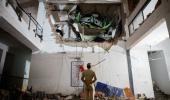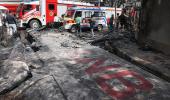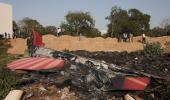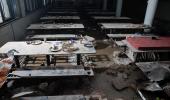'Who gave the Tatas the right to discontinue technically sound practices related to safety and security?'

Thursday's AI 171 flight, a Boeing 787‑8 Dreamliner carrying 242 passengers and crew from Ahmedabad to London's Gatwick, issued a Mayday call moments after takeoff and crashed into a nearby medical college, killing over 250 people -- including locals caught in its path.
As grieving family members try to fathom the terrible Thursday tragedy and as the nation is still in a state of shock, Rashtriya Kamgar Sena President Kiran Pawaskar has drawn attention towards cost-cutting at the national carrier which was sold by the Government of India to the Tatas through a divestment process that was completed in January 2022.
Tata Sons' subsidiary Talace now owns and controls the management at Air India.
Pawaskar -- whose trade union Rashtriya Kamgar Sena is affiliated to Maharashtra Deputy Chief Minister Eknath Shinde's Shiv Sena -- accuses Air India's current management of sidelining safety protocols in a bid to cut costs.
Pilot Cuts Raise Safety Concerns
In the aftermath of one of India's deadliest air disasters, Pawaskar reveals that two months ago, Air India's current management scrapped its long‑standing three‑pilot cockpit regime.
"For long‑haul flights of 10 to 12 hours, you need two flight commanders and a first officer," Pawaskar tells Prasanna D Zore/Rediff.
While he is not directly linking the absence of an additional pilot in the cockpit to the emergency measures that could have been adopted by an additional trained pilot in the cockpit of the ill-fated A1 171 flight, he asks, "It is not the question of what one more pilot in the cockpit would have done but it is a fact that it was a practice to have two flight commanders and one more pilot in the cockpit and that practice was stopped since the last two months by (the management of) Air India."
When asked if the Rashtriya Kamgar Sena had approached the Air India management to discuss this issue, he says, "They need to explain why they have stopped this practice. They don't care two hoots about discussing such issues with the union."
Outsourced C‑Inspection: What It Means
Beyond crew numbers, Pawaskar questions the aircraft's C‑inspection report process.
What is a C‑inspection (C‑check)?
- A comprehensive maintenance audit carried out every 18 to 24 months (or after a set number of flight cycles)
- Engineers strip down and inspect structural parts -- fuselage panels, wing roots, landing gear assemblies -- for corrosion or fatigue.
- Non‑destructive tests (ultrasound, dye‑penetrant) detect hidden cracks
- Full systems checks cover hydraulics, avionics (flight instruments), environmental controls, engines and the auxiliary power unit
- The final report logs each task, any defects found, corrective repairs or parts replaced, man‑hours spent, and is signed off by licensed maintenance engineers
- This document lives in the aircraft's permanent logbook, is essential for regulatory compliance, and serves as a definitive record in any safety investigation.
Allegations of Document Withholding

Pawaskar highlights that Air India historically conducted its C‑inspections in‑house at its own hangars; post‑Tata takeover, they have been outsourced to a Singapore firm.
"They are saying they have complied with the C-inspection requirement from a firm in Singapore. Who has these C-inspection documents?" he asks.
"If that's the case, then show us the documents," he demands.
Cabin Crew Accommodations
Cabin crews have also been compelled into twin‑sharing hotel rooms compromising rest and vigilance, the union leader states.
"Before the Tatas took over, Air India never did this," Pawaskar says, arguing that both crew‑room sharing and pilot cuts are "cost‑cutting exercises at the cost of safety and security."
Union Unheard, Legal Recourse Looms
With management refusing to recognise any union forum, the Rashtriya Kamgar Sena is preparing for legal action.
Pawaskar claims that the Tata management has repeatedly refused to discuss these issues with the Rashtriya Kamgar Sena.
"They don't care two hoots about discussing such issues with the union. They don't recognise any union. They don't discuss these issues with anybody else. They have categorically said that they are not entertaining any union," he claims.
Given this attitude, Pawaskar says the Rashtriya Kamgar Sena will soon seek legal recourse. "We have decided to take this issue up in courts," he informs.
"Through the court we will ask them why did they discontinue with time-proven practices. Who gave the Tatas this right to discontinue technically sound practices related to safety and security (of aircraft and passengers)? We will also ask this to the government (of India)."
As grieving families seek answers, Pawaskar's union vows that no cost‑cutting at Air India will escape his union's scrutiny.










